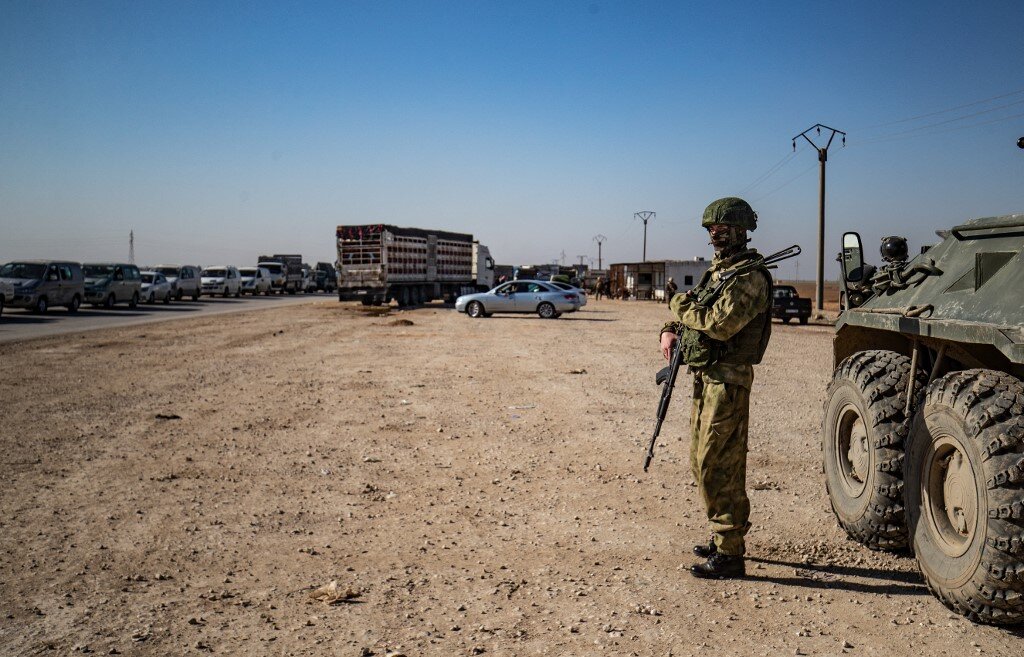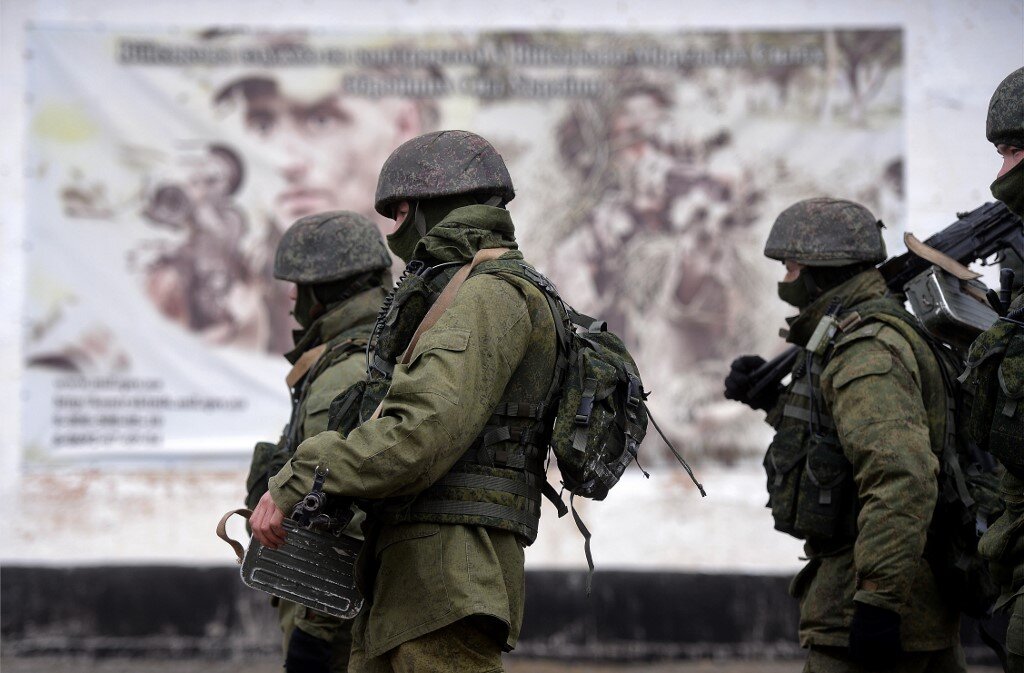A power transition is already under way in Russia amid “increasingly obvious” health problems haunting the country’s President Vladimir Putin and his difficulties acting as the head of the state, according to Ukraine’s Foreign Intelligence Service.
In a white paper report published Jan. 24, the agency noted that Putin’s retirement will not be the end of Russia’s global ambitions or its war on Ukraine.
“The baseline midterm scenario envisages preserving the state model of ‘Putinism’ in Russia, with or without Putin himself,” according to the report. “This is regardless of any specific option — Putin as a president for life, Putin as a national leader, Putin and his inferior co-ruler, or having a Putin heir.”
Protests have gripped Russia since the Jan. 17 arrest of chief Putin critic Alexei Navalny after he returned from Berlin, where he recovered from a likely assassination attempt from Russia’s Federal Security Service. More than 3,300 protesters have been detained in the largest mass arrests in the history of Putin’s presidency.
The Ukrainian intelligence service said that no matter what happens, Russia will try to keep Ukraine in its sphere of influence and disrupt its westward movement.
“This constant is here to stay, in spite of the international environment that is generally unfavorable towards Russia, as well as new factors emerging,” such as Joe Biden’s victory in the U.S. presidential election, energy market turbulence, destructive trends in Russia’s economy and a possible power transition.
In the coming years, the Kremlin is expected to continue trying to bolster Russia’s status as a global power.
“The Kremlin is going to keep raising the stakes in its military-political standoff (with the West), exaggerating its role in combating uncontrolled migration, terror and cybernetic attacks, and fueling disintegration movements in Europe by providing populists and radicals with financial support and provoking economic separation of certain EU nations,” the report stated.
Moscow will try to avoid a serious military confrontation with new NATO nations. “But incidents in air, maritime, and cyber domains are going to be seen again and again, which will keep in place the danger of a Russian-NATO conflict, triggered by an accident,” according to the report.

A Russian soldier stands guard as troops escort a convoy of Syrian civilians leaving the town of Tal Tamr in the northeastern Hasakeh province, to return to their homes in the northern town of Ain Issa in the countryside of the Raqqa region, via the strategic M4 highway, on Jan. 10, 2021. (AFP)
Anti-Ukraine tactics
Ukrainian intelligence is sure the Kremlin will continue to undermine Ukraine’s survival as an independent nation and its role in international relations.
Russia is expected to sabotage Ukraine’s government institutions to present Ukraine as a failed state.
“Russia’s political goal is to destabilize Ukraine’s sociopolitical life to the extent that ‘Kremlin’s assistance’ is the only option towards Ukraine’s ‘survival,'” the report stated.
The Kremlin also wants to strip Ukraine of broad international support by instigating “Ukraine fatigue” in the West. Lobbying and anti-Ukrainian activities are meant to distract Brussels from Ukraine and Eastern Europe.
The occupation of Donbas and Crimea are also key to the Kremlin’s strategy.
Apart from organizing and financing the local militant occupation force, Russia also rotates 2,000-3,000 regular personnel from every military branch through the occupied area and can ramp up its forces there very quickly.
Russia will further try to undermine Ukraine from inside by inserting pro-Russian puppet enclaves through an unjust peace settlement in Donbas, according to the intelligence service. Russia has demanded that Kyiv provide the occupied Donbas with “special territorial status,” carry out elections there and guarantee amnesty for all militants.
“Only after all those steps, Russia and (occupational authorities in Donbas) are going to start fulfilling their obligations, the most important of which is to hand Ukraine control over the entire length of the Russian border in Donetsk and Luhansk Oblast,” the report stated. “At the same time, giving up on border control is Russia’s ‘red line.'”
“And it is almost certain that in the mid-term perspective, Russia will not give up control and will keep making new demands.”
Ukrainian intelligence also expects new Russian sanctions against Kyiv, as well as “financial pressure, energy blackmailing, squeezing Ukrainian manufacturers out of their traditional markets, compromising Ukrainian entities in international markets and investment intrusion via dummy entities.”
“Ukrainian Azov Sea ports are being blocked, and this practice is prepared for being used against Black Sea ports in order to undermine our economic potential,” the report noted.

Russian soldiers walk past a recruitment poster for the Ukrainian armed forces while patrolling the area surrounding the Ukrainian military unit in Perevalnoye, outside Simferopol, on March 20, 2014. (AFP)
Crimean focus
Russia will rely on its presence in occupied Crimea, which has been turned into a giant naval and air base, ensuring the Kremlin’s projection of power in much of the Black Sea region.
“Over the years of occupation (since 2014) we have collected enough open and confidential intelligence confirming the fact that, contrary to its declarations, Moscow has never considered Crimea as part of its economic (industrial, agricultural, touristic, and humanitarian) potential,” the report said.
Since 2014, Russia has increased its strike capabilities in the Ukrainian peninsula, including laying the groundwork for the deployment of nuclear weapons.
“The main objective is to turn Russia into a dominant power in the Black Sea region,” Ukrainian intelligence said.
“Russia has created a powerful combined arms group in Crimea that includes ground-based, airborne, and maritime components and constitutes nearly 32,000 personnel… Nearly all Soviet air defense missile systems capable of carrying nuclear warheads have been employed. Right now, Russian air defense missile systems control most of the Black Sea, while its surface-to-surface missiles possess control of the whole aquatic area.”
The same can be said regarding Russian aircraft and missile carrier ships based in the Crimean port of Sevastopol that also can deliver tactical nuclear strikes, according to the report.
“Russian activities for deploying air defense systems in annexed Crimea, modernizing the Black Fleet, and the massive employment maritime cruise missiles Kalibr-NK and Kalibr-PL indicate Moscow’s plans to ensure its deterrence and denial power not only in the Black Sea but also in the Mediterranean,” according to the report.
